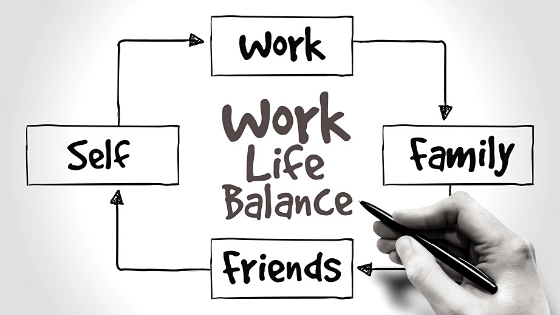Your job can eat your life. In some cases, it won’t even leave crumbs for your family, friends, or passions. Life doesn’t always give us a lot of leeway regarding the hours we need to put in to make ends meet. However, there are almost always some points in our careers where we need to make pivotal decisions about balance. We often have more power than we think.

With that in mind, here are some tips for ways that you can achieve work-life balance.
Tip #1: Decide What Success Means
Do this early in your career. Do it before things start “taking off” in your role in your company. Do this because people around you will start defining success for you if you don’t.
Does success to you look like always sitting down for a meal with your family? Does it look like one great vacation per year that allows you to fully unplug in a cool spot in a faraway corner of the world? It helps to know your personal values, your work style, and what makes you happy when making this decision.
Once you decide what success looks like, start building the requirements into your job roles. It’s a lot harder to claw back time you’ve given up than it is to maintain established boundaries. The “truth” that many employees don’t realise is that an employer that wants you wants you at your best. Companies are often willing to help you live your version of success because they know that it allows you to perform “at peak.”
Tip #2: Know When You’re Guilty of Wasting Time
Some of us put in way too much time at work because we’re not putting in enough time at work. What I mean is that we’re not truly protecting our work time by avoiding distractions. The “opposite” problem of work-life balance that we don’t talk enough about is when our personal lives creep into our work lives. This can be just as destructive as having work-life creeping into home life because it drills down on that same blurring of boundaries.
Avoid zipping between “life” duties and work duties. Be at work when you’re at work. Don’t conduct personal tasks at work. Otherwise, you might find yourself unable to shut things off at night without the tendrils of unfinished work creeping into your evenings and weekends. It’s also important to let your loved ones know that your work time is “sacred.” This is especially important if you work at home. While this may seem cold, it’s important to explain to them that preserving work time is your way of being able to guard your after-hours time with them.
Tip #3: Don’t Consider Time Not Spent Working as Wasted Time
I spent years making the mistake of thinking that I had to live by an “on switch” and “off switch.” I thought that the goal was to work until you were so exhausted that all you could do was collapse on the couch. What I learned later on in my career is that free time should be fulfilling time.
Make your “off-time” as productive as your “on time” by doing things that help you stay healthy. I get my exercise in while swimming at the beach with my family. I am spending time with people I love, engaging in exercise, and doing an activity that I enjoy!
You might also consider taking on new hobbies and interests while you are not working. Mastering a new skill is the best way to keep your brain sharp. Yes, that means that spending your weekend learning how to surf, taking a painting class, or salsa dancing for the first time could allow you to return to the office in even better mental shape while also feeling relaxed and refreshed. Being a curious, whole, and engaged person makes you a better employee —even if that’s not the goal.
Tip #4: Set Healthy Boundaries
I make sure to create healthy work-life boundaries. This is super challenging but essential in not getting burned out from work. Sundays are my “no work” day. I specifically put my phone away when I am spending time with my family.
Tip #5: Make Effective Time Management a Group Goal
If you’re in a leadership position, you have a unique opportunity to foster an atmosphere of value over volume. Encourage your team to use their time wisely. Lead by example by demonstrating your own time management skills. My team can see that I organise my time really well, and they also see how this helps me have a better work-life balance.
Consider hosting a team-wide or company-wide workshop on using time efficiently to avoid overworking. While there may be times when it’s necessary to put all hands on deck, it’s important not to set up the expectation that this pace is the norm. Your team will appreciate your respect for their time outside of work. You’ll also find that having team members who don’t feel like they have to prove themselves by “overworking” allows you to unplug instead of responding to messages during off times.
It Doesn’t Have to Be a Competition Between Work and Life
Personal time is precious. However, that doesn’t mean we have to vilify time spent working. There’s no villain in that! The truth is that drawing boundaries between work and home allows us to be our best at both.





















